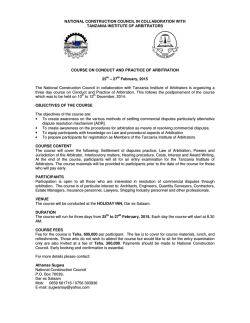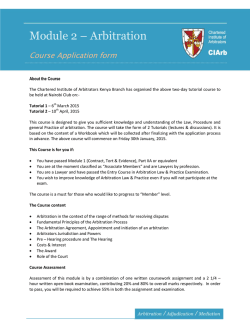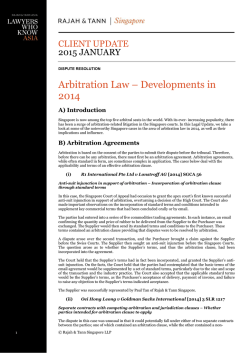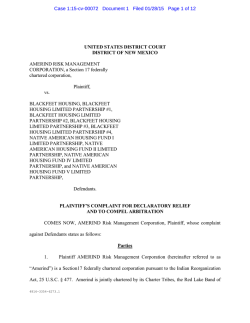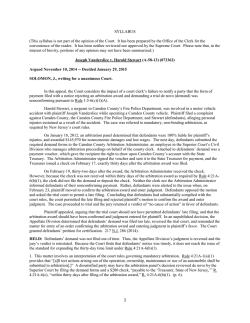
International Arbitration
International Arbitration First Edition Contributing Editor: Joe Tirado Published by Global Legal Group CONTENTS Preface Algeria Argentina Australia Belgium Joe Tirado, Winston & Strawn London LLP Amine Ghellal & Cheikh-Abdelkader Mani, Ghellal & Mekerba María Inés Corrá & Felicitas Fuentes Benítez, M. & M. Bomchil Ernest van Buuren, Martin Davies & Claire Bolster, Norton Rose Fulbright Arnaud Nuyts, Hakim Boularbah & Joe Sepulchre, Liedekerke Wolters Waelbroeck Kirkpatrick Brazil Renato Stephan Grion & Guilherme Piccardi de Andrade Silva, Pinheiro Neto Advogados Cyprus Christiana Pyrkotou & Eleanor Ktisti, Andreas Neocleous & Co LLC DRC Aimery de Schoutheete, Liedekerke Wolters Waelbroeck Kirkpatrick Denmark Jens Rostock-Jensen & Sebastian Barrios Poulsen, Kromann Reumert Ecuador Jorge Sicouret Lynch & Pedro José Izquierdo Franco, Coronel & Perez England & Wales Joe Tirado, Winston & Strawn London LLP Estonia Arne Ots & Maria Teder, Raidla Lejins & Norcous Finland Nina Wilkman & Niki J. Welling, Borenius Attorneys Ltd France Alexandre de Fontmichel, Scemla Loizon Veverka & de Fontmichel A.A.R.P.I. Germany Dr. Gert Brandner, LL.M. & Dr. Roland Kläger, Haver & Mailänder Hungary József Antal & Bálint Varga, Kajtár Takács Hegymegi-Barakonyi Baker & McKenzie India Neeraj Tuli & Rajat Taimni, Tuli & Co Indonesia Alexandra F. M. Gerungan, Lia Alizia & Rudy Sitorus, Makarim & Taira S. Ireland Kevin Kelly & Emma Hinds, McCann FitzGerald Israel Moshe Merdler, Ziv Lev & Co. Law Office Kazakhstan Sergei Vataev, Dechert Kazakhstan Ltd Kyrgyzstan Nurbek Sabirov, Kalikova & Associates Law Firm Lithuania Paulius Docka, VARUL & partners Mexico Cecilia Flores Rueda, FloresRueda Abogados Morocco Abdelatif Boulalf & Ahlam Mekkaoui, Boulalf & Mekkaoui Netherlands Hilde van der Baan, Allen & Overy LLP Romania Alina Popescu & Gelu Maravela, Maravela & Asociații SCA Russia Vasily Kuznetsov, Quinn Emanuel Urquhart & Sullivan LLP Sierra Leone Glenna Thompson, BMT Law Slovenia Boštjan Špec, Law Firm Špec Spain José María Fernández de la Mela, Heidi López Castro & Luis Capiel, Uría Menéndez Sweden Fredrik Norburg & Pontus Scherp, Norburg & Scherp Advokatbyrå Switzerland Dr. Urs Weber-Stecher & Flavio Peter, Wenger & Vieli Ltd. Turkey Pelin Baysal, Beril Yayla Sapan & Neslişah Borandı, Gün + Partners Ukraine Anton Sotir & Anastasiia Slobodeniuk, GoldenGate Law Firm United Arab Robert Karrar-Lewsley, John Gaffney & Dalal Al Houti, Emirates Al Tamimi & Company USA Chris Paparella & Andrea Engels, Hughes Hubbard & Reed LLP 1 9 23 33 47 58 68 81 89 98 115 126 134 142 152 156 163 171 181 187 198 205 215 223 230 241 251 260 264 272 283 293 303 311 323 336 Spain José María Fernández de la Mela, Heidi López Castro & Luis Capiel Uría Menéndez Introduction When resolving commercial disputes in Spain, arbitration has become an effective and reliable alternative to the courts. Three key factors have driven the successful development of Spanish arbitration in recent years: a favourable legal framework, a pro-arbitration judicial system, and a dynamic arbitration community. Enacted in 2003 and firmly based on the UNCITRAL Model Law, the Spanish Arbitration Act (the “Arbitration Act”) set the stage for a well-rounded and modern arbitration legal framework, supplemented by the provisions of three international conventions: the New York Convention (ratified by Spain without reservation in 1977), the European Convention (ratified in 1975), and the ICSID Convention (ratified in 1994). By providing national and foreign businesses with an efficient and flexible dispute resolution tool, the Arbitration Act has engendered two clear benefits: the courts have been relieved of a substantial case-load for which the arbitral venue results in a more suitable choice, and Spain has developed a reputation as a seat of international arbitration. After years of growth in the popularity of arbitration, the Arbitration Act was fine-tuned in 2011 in order to take advantage of the opportunities for enhancement that experience had revealed. Among other improvements, the (limited) powers of judicial control over arbitration were concentrated in the High Courts of Justice in order to unify case-law and guarantee greater legal certainty. As a result, the High Courts of Justice have jurisdiction over actions to set aside arbitral awards made in Spain and over applications for recognition of foreign awards. Conversely, the role of supporting arbitration generally falls under the authority of the Courts of First Instance, which are therefore competent to rule on assistance in the taking of evidence, granting judicial interim measures, and enforcing awards. As part of the efforts to build a solid and effective judicial infrastructure to back arbitration and standardise the criteria applied in arbitration-related court proceedings, a new Court of First Instance specialising in arbitration was created in Madrid in 2010. Organisational questions aside, the development of a well-established arbitration practice in Spain would not have been possible without the support of the Spanish judiciary, which has shown the utmost deference towards arbitrators as part of a manifestly pro-arbitration stance. A notable recent example is the decision by the Madrid Provincial Court confirming the validity of arbitration clauses allowing parties to resort either to arbitration or litigation at their sole will. The Court of Arbitration of Madrid (CAM) and the Civil and Commercial Arbitration Court of Madrid (CIMA) are the two major arbitration bodies in Spain. Both centres have built robust expertise in administering international and domestic arbitral proceedings under GLI - International Arbitration First Edition 272 © Published and reproduced with kind permission by Global Legal Group Ltd, London www.globallegalinsights.com Uría Menéndez Spain different laws, in various languages and across a wide array of sectors. The number of domestic and international cases they have handled has been rapidly increasing over the past few years and the trend shows no sign of abating. Additionally, the Spanish Arbitration Club (Club Español del Arbitraje or CEA) has played a prominent role in promoting the use of arbitration in the Spanish and Portuguese languages, with a special focus on Latin America. Since its incorporation in 2005, CEA has brought together leading practitioners from multiple jurisdictions to discuss the challenges facing the arbitration community, paying particular attention to the standards of ethics and good practice upon which trust in arbitration ultimately depends. Among other useful CEA publications, its Recommendations on the Independence and Impartiality of Arbitrators (2008) and Code of Good Arbitration Practices (2009) represent widely accepted standards in Spanish arbitration practice. Arbitration agreement An arbitration agreement is valid under Spanish law if it conveys the parties’ intention to submit to arbitration either present or future disputes (article 9(1) of the Arbitration Act). Therefore, consent is the cornerstone of arbitration under Spanish law. Spanish law also requires that the arbitration agreement be in writing (article 9(3) of the Arbitration Act). However, an arbitration agreement does not need to be signed by the parties. It may be present in any exchange of communication between the parties, which provides a record of the agreement. It can also be incorporated by reference or be deduced from an exchange of a statement of claim and a statement of defence in which the arbitration agreement has been acknowledged by one party and not denied by the other (article 9(3), (4) and (5) of the Arbitration Act). Regarding consent to arbitrate, Spanish courts have very recently confirmed the validity of hybrid clauses allowing the parties to resort either to arbitration or to litigation, at their sole will once the dispute arises. Furthermore, Spanish courts pay special attention to the drafting of the scope of an arbitration agreement when considering whether a party has submitted a particular dispute to arbitration. Occasionally, Spanish courts have interpreted the scope of an arbitration agreement strictly when faced with an arbitration clause for disputes related to “the interpretation” of a contract – as opposed to any dispute in relation to a contract – excluding disputes regarding the execution of the contract from the scope of the arbitration. Regarding the form of the arbitration agreement, Spanish courts follow the norm and consider arbitration agreements valid if there is written proof of their existence. As such, although in limited cases, Spanish courts have extended arbitration agreements to nonsignatories in cases of succession, novation, third party beneficiaries, or when the corporate veils are pierced. This approach has been supported by many Spanish scholars, who consider that arbitration agreements should be extended if proof of consent can be deduced from the circumstances of the case. Any matters that may be freely disposed of at law are capable of being settled by arbitration (article 2(1) of the Arbitration Act). Spanish law specifically recognises arbitration agreements established in articles of association of companies for internal disputes, either when they were incorporated or subsequently if at least two thirds of the company’s share capital has approved such agreement. The challenge of company resolutions can also be submitted to arbitration although, in this case, arbitration must be administered by an arbitral institution and the appointment of arbitrators must be entrusted to the institution itself (article 11 bis of the Arbitration Act). GLI - International Arbitration First Edition 273 © Published and reproduced with kind permission by Global Legal Group Ltd, London www.globallegalinsights.com Uría Menéndez Spain Moreover, special regulations exist regarding arbitration agreements entered into with Spanish public entities (limiting either their objective or subjective arbitrability). Notwithstanding this, a public entity cannot rely upon the prerogatives of its own law to avoid obligations arising from an arbitration agreement (article 2(2) of the Arbitration Act). This rule, however, only applies to international arbitration, defined in article 3 of the Arbitration Act as a domestic or foreign arbitration with an international element. Article 9(6) of the Arbitration Act has a provision in favorem validitatis of the arbitration agreement: the arbitration agreement (both its subjective and objective arbitrability) is valid if it conforms either with the law chosen by the parties to govern the arbitration agreement, with the law applicable to the merits of the case, or with the Spanish law. Again, this rule only applies to international arbitration. Spanish courts recognise both the negative and positive effects of an arbitration agreement. On the one hand, article 22 of the Arbitration Act specifically recognises the principle of Kompetenz-Kompetenz, and the parallel principle of separability of the arbitration clause, without which the first principle would be undermined. On the other hand, a Spanish court seized with a claim, when an arbitration agreement exists, will decline its jurisdiction in favour of arbitration if so requested by the counterparty through a plea objecting to the jurisdiction of the court. Recent case law shows that courts still follow a mixed approach when declining their jurisdiction in favour of arbitration. Some decisions have been reached with a prima facie analysis of the existence and validity of the arbitration agreement. In other cases, full proof is required before declining jurisdiction. A request for interim measures is not considered a waiver of the arbitration agreement, and parties may seek interim relief from the Spanish courts either before arbitration starts or during the arbitral proceedings. Arbitration procedure The sole mandatory provision concerning the arbitration procedure in Spain is article 24 of the Arbitration Act, which enshrines the principle of due process, specifically the principle of equal treatment of the parties and the parties’ right to fully present their case, and requires that the arbitrators, parties and arbitral institutions, as appropriate, honour the confidentiality of the information received in the course of arbitral proceedings. The parties are otherwise free to agree on the procedure to be followed (also by reference to institutional rules or soft law, such as the IBA Rules on the Taking of Evidence) (article 25(1) of the Arbitration Act). In the absence of an agreement, the arbitral tribunal has ample discretion to conduct the arbitration as it deems appropriate (article 25(2) of the Arbitration Act). The parties are free to agree on the seat of the arbitration. In the absence of an agreement, the arbitral tribunal will determine the seat, taking into account the circumstances of the case and the convenience to the parties (article 26 of the Arbitration Act). Hearings and deliberations may be held in any location, irrespective of the seat of the arbitration (article 26(2) of the Arbitration Act). Unless the parties have agreed that no hearings will be held, the arbitral tribunal may hold hearings at its discretion and shall do so at an appropriate stage of the proceedings, if so requested by a party (article 30(1) of the Arbitration Act). The parties must be given sufficient notice for all hearings as well as the opportunity to participate in the hearings (article 30(1) of the Arbitration Act). Failing an agreement by the parties, and if the question cannot be determined on the grounds GLI - International Arbitration First Edition 274 © Published and reproduced with kind permission by Global Legal Group Ltd, London www.globallegalinsights.com Uría Menéndez Spain of the circumstances of the case, the arbitration will be conducted in any of the official languages of the place of the proceedings (article 28(1) of the Arbitration Act). Mirroring article 21 of the UNCITRAL Model Law, article 27 of the Arbitration Act stipulates that, unless otherwise agreed by the parties, arbitral proceedings are commenced by notifying the respondent of a request for arbitration. Except for the general requirements on notifications under article 5 of the Arbitration Act, there are no formal requirements concerning any mandatory content for the request for arbitration. Nevertheless, the parties’ agreement or the arbitration rules chosen by the parties may contain applicable requirements. Subject to the agreement of the parties, the arbitral tribunal is granted broad powers to determine the admissibility, relevance, materiality, taking (including ex officio) and evaluation of the evidence (article 25(2) of the Arbitration Act). In international arbitrations seated in Spain, arbitrators often seek guidance from the IBA Rules on the Taking of Evidence, especially regarding document production. There is no limitation on the types of admissible evidence and the Arbitration Act only contains provisions regarding the appointment of experts by the arbitral tribunal and the assistance of domestic courts in the taking of evidence. The arbitral tribunal may order a party to provide the appointed expert any relevant information, or to produce or provide access to any relevant documents or items (article 32(1) of the Arbitration Act). The arbitral tribunal may request court assistance in the taking of evidence. Assistance may consist of the taking of evidence before the court or the court adopting specific measures necessary for the evidence to be taken before the arbitrators (article 33 of the Arbitration Act). Spanish legislation does not contemplate any further intervention by the courts, either with regard to procedural objections or with regard to any other procedural issues. In line with article 5 of the UNCITRAL Model Law, domestic court intervention in arbitration procedures is expressly prohibited (article 7 of the Arbitration Act), unless expressly permitted in the Arbitration Act. Arbitrators All natural persons in full possession of their civil rights may act as arbitrators, provided that they are not restricted by legislation applicable to them in the exercise of their profession. Unless otherwise agreed by the parties, no person will be precluded from acting as an arbitrator by reason of nationality (article 13 of the Arbitration Act). At least one member of a panel of arbitrators must be a jurist. A sole arbitrator must be a jurist unless the arbitration will be decided ex aequo et bono (article 15 of the Arbitration Act). The parties are free to determine the number of arbitrators, provided there are an odd number (article 12 of the Arbitration Act), and to agree on the arbitrators or the procedure for appointing the arbitrators, provided that the principle of equal treatment of the parties is respected (article 15(2) of the Arbitration Act). They may also agree to entrust the appointment of arbitrators to arbitral institutions, who will see to the compliance with the capacity requirements of arbitrators and transparency in their appointment, as well as their independence (article 14(1) and (3) of the Arbitration Act). In the absence of an agreement by the parties on the number of arbitrators, a sole arbitrator will be appointed (article 12 of the Arbitration Act). GLI - International Arbitration First Edition 275 © Published and reproduced with kind permission by Global Legal Group Ltd, London www.globallegalinsights.com Uría Menéndez Spain If the parties fail to reach an agreement on the procedure to appoint a sole arbitrator, the arbitrator will be appointed by the competent court upon the request of any of the parties. The default rules for panels with three arbitrators are consistent with international arbitration practice: each party appoints one arbitrator. The two appointed arbitrators appoint the third arbitrator, who chairs the arbitration panel. If a party fails to appoint an arbitrator within 30 days of receipt of the other party’s request to do so, the appointment of the arbitrator will be made by the competent court upon request of any of the parties. The same occurs when the two appointed arbitrators fail to reach an agreement on the third arbitrator within 30 days of the most recent acceptance. For multi-party arbitrations, the claimants (or the respondents, as the case may be) will jointly appoint one arbitrator. If the claimants or respondents fail to agree on the appointment of their respective arbitrator, all arbitrators will be appointed by the competent court upon the request of any of the parties (article 15(2) of the Arbitration Act). An arbitrator may be challenged when there is justifiable doubt as to the arbitrator’s impartiality, independence or qualifications (article 17(3) of the Arbitration Act). An arbitrator’s mandate may also terminate when an arbitrator becomes, de jure or de facto, unable to perform the corresponding functions or for other reasons fails to act without undue delay (article 19(1) of the Arbitration Act). In order to challenge an arbitrator in the absence of an agreement otherwise between the parties, a party must state the reasons for the challenge within 15 days of becoming aware of the acceptance or of any circumstance likely to give rise to justifiable doubts as to the arbitrator’s impartiality or independence. Subsequently, the arbitrator may resign, the other party may join the challenge, or the arbitrators may decide on the challenge. Domestic courts may not intervene in the challenge process, although an unsuccessful challenging party may, if appropriate, raise the challenge when seeking to set aside the award (article 18 of the Arbitration Act). The IBA Guidelines on Conflicts of Interest in International Arbitration are often referred to for guidance in Spanish international arbitration practice. Spanish domestic courts have nevertheless so far been reluctant to apply them either directly or even as a source of guidance. If an arbitrator must be replaced, the subsequent appointment will be made according to the same rules as those that governed the appointment of the arbitrator being replaced (article 20(1) of the Arbitration Act). Arbitrators are bound to loyally comply with their duties. If those duties are not complied with, the arbitrators will be liable for any damages they cause by reason of bad faith, recklessness or wilful misconduct (article 21(1) of the Arbitration Act). Interim relief Spain is regarded as a particularly effective jurisdiction for obtaining and enforcing interim measures in support of arbitral proceedings, regardless of the place of the arbitration. Spanish law confers ample powers upon arbitrators and courts alike to order interim measures, providing a comprehensive yet flexible procedural framework under which interim relief applications are handled with efficiency and certainty. Unless otherwise agreed by the parties, arbitrators sitting in Spain are vested with the broadest powers to grant, at the request of any party, any interim relief that they may consider necessary to safeguard the effectiveness of the future award on the merits. The Arbitration Act does not list or in any other way restrict the range of interim measures GLI - International Arbitration First Edition 276 © Published and reproduced with kind permission by Global Legal Group Ltd, London www.globallegalinsights.com Uría Menéndez Spain available to arbitral tribunals. The Arbitration Act remains equally silent as to the legal standards for granting interim relief, simply noting that arbitrators may require appropriate security in connection with the measure. As a result, in principle, arbitral tribunals have complete discretion to decide on interim relief applications. Arbitral decisions on interim measures are subject to the rules governing the setting aside and enforcement of awards, regardless of the form that the decisions may take. Accordingly, the interim relief decisions will be immediately enforceable when the arbitrators are sitting in Spain, prior recognition being necessary otherwise. Spanish courts do not generally interfere with interim measures granted by arbitral tribunals; this is consistent with their traditionally high degree of deference towards arbitration. In this regard, there is at least one judicial precedent concerning the denial of a request for an anti-arbitration injunction in aid of domestic litigation, which the court found contrary to the autonomy and negative effect of the arbitration agreement. We are not aware, however, of any anti-suit injunction issued by Spanish courts in support of arbitration in Spain. In any event, such a judicial measure would be exceptional in light of the European Court of Justice’s preliminary ruling in West Tankers (case C-185/07), which deprived Member States’ courts of the power to grant anti-suit injunctions to halt foreign litigation proceedings brought in breach of an arbitration agreement. On the other hand, Spanish courts are expressly empowered to grant interim relief in support of arbitration, irrespective of whether the place of arbitration is in Spanish territory or elsewhere. An application for a judicial interim measure in support of arbitration will be successful if the court is satisfied that: (i) the party seeking interim relief is likely to succeed on the merits; (ii) the effectiveness of any redress that may eventually be granted in the award would be jeopardised should the interim measure be denied; and (iii) the applicant has offered (and will provide) security sufficient to compensate any damage resulting from the adoption of the interim measure. An interim measure may be requested from a court even before arbitration proceedings are brought as long as the applicant demonstrates the existence of urgent and exceptional circumstances. Such a preliminary measure will nevertheless expire if a request for arbitration is not lodged within 20 days of the date on which the interim measure was ordered. Timing issues aside, interim measures are not generally granted before the party against whom the measures are sought has been afforded an opportunity to be heard. Spanish courts’ traditional reluctance to order ex parte measures may be exceptionally overcome, however, if the court is satisfied that hearing the party against whom interim relief is sought before ruling on the issue might jeopardise the effectiveness of the very measure requested. Should that be the case, any parties left unheard before the interim measure was ordered will subsequently have an opportunity to challenge the measure, and eventually have it lifted or replaced with alternative security. Despite some undeniable advantages in seeking interim relief from the arbitrators, judicial measures remain the preferred option in Spanish arbitration practice, as they can be processed more swiftly (i.e., without waiting until the arbitral tribunal is fully constituted) and enforced more easily by the same court that adopted them. This court-oriented practice might, however, be impacted by the pre-arbitral emergency protective measures (particularly emergency arbitrator mechanisms) recently implemented by many leading institutional arbitral centres, such as the ICC and the Court of Arbitration of Madrid. The practical use and effectiveness of these mechanisms should therefore be monitored closely over the coming months. GLI - International Arbitration First Edition 277 © Published and reproduced with kind permission by Global Legal Group Ltd, London www.globallegalinsights.com Uría Menéndez Spain Arbitration award Where more than one arbitrator is appointed, any decision − including awards − must be made by a majority, unless otherwise agreed by the parties. If there is no majority, the decision will be made by the presiding arbitrator (article 35(1) of the Arbitration Act). Awards must be made in writing (which is deemed to include electronic, optical or any other medium that allows the contents and signatures of the award to be recorded and accessed for subsequent consultation) (article 37(3) of the Arbitration Act), state the date and place of arbitration (article 37(5) of the Arbitration Act) and be signed by the arbitrators, who may cast their vote for or against the decision (where there is more than one arbitrator, the signatures of the majority of all members of the arbitral tribunal or that of its presiding arbitrator alone shall suffice, provided that the reason for any omitted signature is stated) (article 37(3) of the Arbitration Act). Except for awards on agreed terms, awards must include a reasoned decision (article 37(4) of the Arbitration Act). Unless otherwise agreed by the parties, the arbitrators will decide the dispute in a single award or in as many partial awards as they consider necessary (article 37(1) of the Arbitration Act). The arbitrators will decide the dispute within six months of the exchange of the first round of memorials on the merits (after constitution of the arbitral tribunal). That term may be extended by the arbitrators, through a reasoned decision, for a period not exceeding two months. The parties are free to agree otherwise on the timeframe for issuing the award, including the agreement on institutional rules that entitle the arbitral institution to extend the timeframe for issuing the final award. In any event, unless otherwise agreed by the parties, the expiry of the corresponding period without the definitive award having been rendered does not affect the validity of the arbitration agreement or the validity of the award rendered, without prejudice to any liability the arbitrators may incur (article 37(2) of the Arbitration Act). Subject to the agreement of the parties, the arbitrators will include a decision in the award on the costs of the arbitration, which shall include the arbitrators’ fees and expenses and, where applicable, the fees and expenses of the parties’ counsel or representatives, the cost of the services provided by the institution administering the arbitration, and other expenses arising from the arbitral proceedings (article 37(6) of the Arbitration Act). The arbitral tribunal is not bound by any default rules for cost allocation and recovery and is free to exclude any fees and expenses it considers inappropriate or excessive. Arbitral panels customarily follow a type of costs-follow-the-event rule; however, it is increasingly common that other criteria be taken into consideration, including the parties’ procedural conduct. The award of interest for principal claims and for costs is regarded as a substantive matter and thus depends on the law applicable to the merits. Challenge of the arbitration award The annulment of either a national or international award rendered in Spain can be sought before the High Court of the corresponding Autonomous Region within two months following the issuance of the award. This is the only way of challenging awards under Spanish law. The award can only be annulled if one of the grounds for annulment set out in article 41 of the Arbitration Act is met. These grounds primarily mirror the grounds for opposition to the enforcement of foreign awards foreseen in the New York Convention. Once annulment GLI - International Arbitration First Edition 278 © Published and reproduced with kind permission by Global Legal Group Ltd, London www.globallegalinsights.com Uría Menéndez Spain proceedings start, the court seized can annul an award on its own initiative (even if the ground has not been relied upon by the party challenging the award), if it finds that the award goes against public policy, that there is a lack of objective arbitrability, or that one of the parties has not been given appropriate notice of the appointment of an arbitrator or the arbitration proceedings or has not had the opportunity to present his/her case. An error of law does not constitute, per se, a ground for annulment. Spanish courts have generally followed a favourable and respectful approach towards arbitration and have been reluctant to annul arbitration awards unless serious grounds for annulment were found. State courts have furthermore often refused to go into the merits of a case, even if indirectly led by the parties to do so, and have focused on whether any of the grounds for annulment was met without analysing the correctness of the award. Conflict with public policy is the ground most often raised by parties in Spain to try to have an award annulled. In terms of public policy, Spanish courts differentiate between procedural public policy and material public policy. Procedural public policy is generally assimilated to the rights of due process and equal treatment, while material public policy is defined as the essential principles and rights of the Spanish State, generally identified with the rights set out in the core articles of the Spanish Constitution. A line of cases of the European Court of Justice has extended the concept of public policy to the core principles of the European Union. To be able to annul an award, the party challenging the award must have been diligent and tried to remedy the alleged defect when it occurred with the mechanisms available. Article 6 of the Arbitration Act clearly states that “where a party, knowing of the infringement of any non-mandatory provision of this Act or any requirement of the arbitration agreement, does not state its objection within the term provided or, in the absence of such a term, as soon as possible, that party will be deemed to have waived its right to object as provided in this Act.” Spanish courts have been consistent in rejecting annulment when the ground for annulment could have been avoided by the party challenging the award. In this regard, note should be taken that the Arbitration Act foresees a mechanism by which a party may request the arbitral tribunal within 10 days of the issuance of the award to correct any computation, clerical or typographical errors, to clarify specific parts of the award, to issue an additional award on claims submitted but not decided, or to rectify an award that has ruled on claims that were not submitted to the tribunal or were not arbitrable. Enforcement of the arbitration award Domestic awards (i.e., those rendered in Spain) are final, binding and enforceable, and can therefore be relied upon to bring enforcement proceedings on the same basis as national final court judgments. In fact, an award is enforceable even if a set-aside action has been brought. In the latter case, however, the party against whom enforcement is sought may request the competent court to stay the enforcement proceedings, provided that it offers security for the amount awarded in addition to any damages that could derive from the delay in the enforcement of the award. By contrast, the effectiveness of foreign awards (i.e., awards made outside Spain) is subject to a court decision traditionally referred to as exequatur, by means of which foreign awards are recognised and declared enforceable in Spain. The New York Convention (the “Convention”), which Spain ratified without reservation, is the cornerstone of the Spanish system of recognition and enforcement of foreign awards, albeit without prejudice to the provisions of other, more favourable, international conventions. GLI - International Arbitration First Edition 279 © Published and reproduced with kind permission by Global Legal Group Ltd, London www.globallegalinsights.com Uría Menéndez Spain Spanish courts have consistently shown a favourable attitude toward the recognition of foreign awards. This pro-arbitration approach underpins the well-established court doctrine that the merits of the dispute are not subject to review in exequatur proceedings. Rather, the scope of these proceedings is strictly limited to examining whether the recognition requirements under the Convention are met. Accordingly, the court will be exclusively concerned with confirming the existence of both the award and the arbitration agreement (article IV of the Convention) and considering the specific grounds for refusal of recognition upon which the party against whom recognition is sought may rely (article V of the Convention). Awards set aside in the country of origin are not generally recognised in Spain pursuant to article V(1)(e) of the Convention. Case law and scholars note, however, that a foreign award set aside in the country of origin may exceptionally be recognised in Spain if the grounds upon which it was vacated were contrary to Spanish public policy, thus suggesting a certain degree of discretion in the application of article V(1)(e). That solution rests, at least partially, on the European Convention rule that awards may still be recognised if they have been annulled for reasons other than: (i) invalidity of the arbitration agreement; (ii) violation of due process; (iii) excess of powers by the arbitrators; or (iv) irregularities in the arbitral procedure. Spain is one of 30 state parties to the European Convention, which therefore applies to the recognition of awards falling under its scope and may, in any event, be relied upon as a more favourable international convention. The recognition of awards currently subject to challenge in the country of origin is less problematic than that of awards already set aside, as article VI of the Convention does not, in the view of Spanish courts, provide for an automatic stay of the exequatur proceedings merely because an application to set aside the award is pending. Once the exequatur is granted, the actual enforcement of a foreign award is a straightforward process involving the attachment and realisation, when needed, of the debtor’s assets, with no significant differences from the procedure for a domestic award or national final judgment. Jurisdiction over exequatur applications lies with the High Court of the corresponding Autonomous Region, whereas enforcement proceedings must be brought before the Courts of First Instance. Contrary to what this duality might suggest, the allocation of exequatur and enforcement proceedings to different courts has thus far proven a well-aimed effort at both expediting the recognition and enforcement of foreign awards and standardising the criteria applied in exequatur proceedings, as the High Courts of Justice have a significantly lighter case-load and are fewer in number (and thus less likely to diverge in opinion) than the Courts of First Instance. Recently, the award rendered in the ICSID case Víctor Pey Casado and President Allende Foundation v. Republic of Chile was enforced directly (i.e., without prior exequatur), in accordance with article 54(1) of the ICSID Convention. This direct enforcement, granted by the new Court of First Instance in Madrid (specialising in arbitration), was unprecedented in Spain. Investment arbitration Investment arbitration is not specifically regulated under Spanish law. Therefore, unless more favourable rules have been adopted in international instruments, the Arbitration Act applies to investment arbitration. Spain has signed more than 70 bilateral investment treaties and is also a party to multilateral GLI - International Arbitration First Edition 280 © Published and reproduced with kind permission by Global Legal Group Ltd, London www.globallegalinsights.com Uría Menéndez Spain treaties such as the Energy Charter Treaty. All these treaties establish the possibility for investors to resort to arbitration. The arbitration is generally set up as an ad hoc arbitration under the UNCITRAL Rules of Arbitration, or as an ICSID Arbitration. It is worth noting that the competences regarding investments have shifted to the European Union, which is now negotiating new investment agreements with third-party States. This does not affect the validity of the existing treaties entered into by Spain although special rules have been set by the European Union, for example, in terms of distribution of responsibilities (EU Regulation 1219/2012 and 912/2014). Until recently, Spain had been involved in very few investment arbitrations and thus case law on the subject is still rather scarce. However, the award rendered in the ICSID case Víctor Pey Casado and President Allende Foundation v. Republic of Chile has allowed the Spanish courts to rule on the subject in an unprecedented judgment. The enforcement of the award was sought in Spain and the Spanish court enforced it directly (without prior exequatur), in accordance with article 54(1) of the ICSID Convention. Moreover, the court seized also complied with article 53 of the Washington Convention and decided not to suspend the enforcement of the award, although an annulment procedure was on-going under the ICSID rules, since the annulment committee had not suspended the enforcement of the award. GLI - International Arbitration First Edition 281 © Published and reproduced with kind permission by Global Legal Group Ltd, London www.globallegalinsights.com Uría Menéndez Spain José María Fernández de la Mela Tel: +34 91 587 08 79 / Email: [email protected] José María is a senior associate in the Madrid office of Uría Menéndez, specialising in dispute resolution. He joined the firm in 2004 and has developed his international experience and profile by spending time in the Miami office of Holland & Knight in 2008 and in the New York office of Cravath, Swaine & Moore LLP between 2014 and 2015. José María has represented clients in court proceedings and in arbitrations administered by the major arbitral institutions, as well as in ad hoc arbitrations. He has handled matters involving complex commercial disputes under different laws across a range of industries, including private equity, construction, energy, electronics and military technology. He received a double degree in Law and Business Administration from Universidad Pontificia Comillas (ICADE) in Madrid and an LL.M. from Georgetown University in Washington, D.C. He regularly lectures on the LL.M. programme at the Instituto de Empresa in Madrid. Heidi López Castro Tel: +34 91 587 09 90 / Email: [email protected] Heidi López is a senior associate at Uría Menéndez’s Madrid office. She joined the firm in 2007 and has since worked in the International Arbitration and Litigation Practice Areas. She was seconded to the International Arbitration Department of the Paris office of Bredin Prat as a foreign associate from March 2012 to September 2012. Heidi has participated either as counsel or secretary to arbitral tribunals in commercial and investment arbitration proceedings, with their seats in Brussels, Bucharest, Geneva, Madrid, Paris, Stockholm, Tel Aviv, Washington and Zurich – among others – both ad hoc and under the rules of various international arbitration institutions, such as the ICC, LCIA, ICSID and CAM. Heidi has experience in a number of sectors such as banking, construction, M&A, energy and oil & gas, and the protection of foreign investment. Luis Capiel Tel: +56 22 429 38 41 / Email: [email protected] Luis Capiel studied law in Germany (Law Degree, Humboldt Universität zu Berlin, 2003) and New Zealand (LL.M., First Class Honours, University of Auckland, 2007) and he is member of the Madrid and the Munich Bars. He joined Uría Menéndez’s international arbitration team in 2011, after spending the initial years of his career in Germany, Argentina and Spain. He focuses his practice on international arbitration in Europe and Latin America and has experience of complex international disputes in the engineering and construction, banking and finance, insurance, private equity, electricity, and oil & gas sectors, among others. He has acted as counsel and secretary to arbitral tribunals in commercial and investment arbitrations, seated in Spain and abroad, under a variety of applicable domestic laws and under the rules of the major arbitral institutions across Europe and the Americas. From 2014 to 2015 he headed Uría Menéndez’s office in Santiago de Chile. Uría Menéndez Príncipe de Vergara 187, Plaza de Rodrigo Uría, 28002 Madrid, Spain Tel: +34 915 860 400 / Fax: +34 915 860 403/4 / URL: http://www.uria.com GLI - International Arbitration First Edition 282 © Published and reproduced with kind permission by Global Legal Group Ltd, London www.globallegalinsights.com Other titles in the Global Legal Insights series include: • Banking Regulation • Bribery & Corruption • Cartels • Corporate Real Estate • Corporate Tax • Employment & Labour Law • Energy • Litigation & Dispute Resolution • Merger Control • Mergers & Acquisitions Strategic partners: www.globallegalinsights.com
© Copyright 2026
